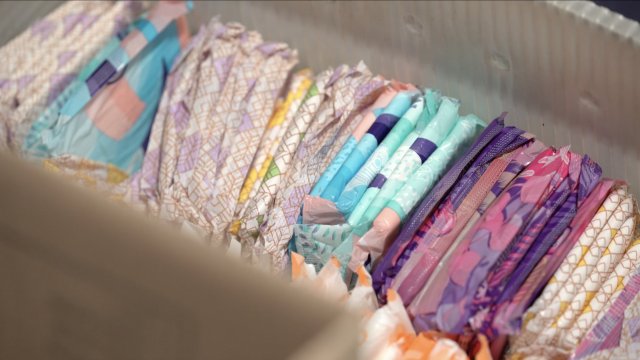In a warehouse outside of Chicago, Ida Melbye and a member of her team sort through hundreds of donations of products that not many people like to talk about.
"Period poverty was an issue that I had never had to deal with personally, but when I learned about it, it was just something that I couldn't stop thinking about," she said.
Fighting period poverty is the issue her nonprofit of seven years, The Period Collective, is on a mission to wipe out.
What is period poverty exactly? According to a 2021 survey from U By Kotex, two in five women struggle to buy period products, and this can lead to using substitute products, like socks, stretching products past when they're no longer safe or hygienic to use them, and missing school or work.
SEE MORE: New Mexico will offer free feminine hygiene products in school
According to the National Organization for Women, the average person who has their period spends $20 per month on supplies.
"It's really hard to live day to day when you don't have the product you need," said Melbye.
Lacey Gero is the manager of state policy at the Alliance for Period Supplies, a national network of non-profits that work to end period poverty.
A big piece of their work is advocating for removing taxes on period products. She says that over the last year, they've seen a big spike in bills, advocating for that as well as more free period products in public places.
"We're seeing a lot more bipartisan support for this issue, and really in a lot of red states," Gero said.
Right now there are 128 pieces of active menstrual equity legislation pending across the country, many of which, especially when it comes to repealing taxes on period products, are in conservative states.
SEE MORE: If you menstruate and you live in NYC, listen up
"We're definitely seeing that there is a more awareness about supporting women and families right now," she said.
Advocates believe that the overturning of abortion rights by the Supreme Court has put a new spotlight on women's issues overall.
"We are excited to see this, the reasons might be, vague and, controversial. but for us, this is an exciting uptick to see that women who are struggling to afford products will finally have some support from their state and government," said Gero.
While product support is good news for people like Melbye and Gero, there is some pushback from local lawmakers who do not believe government dollars should be spent in this way.
Regardless of whether or not these bills are passed, Melbye says she and others like her will continue to be a monthly safety net for women who need help.
"The more lawmakers talk about it, the more influencers talk about it, the more anybody talks about it, the better," she said.






